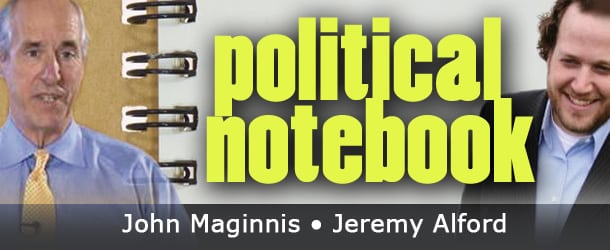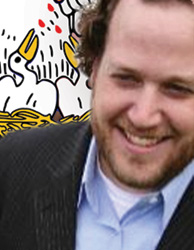While bogged down with qualifying candidates last month, Secretary of State Tom Schedler didn’t lose sight of the true endgame coming in November and December.
He said in an interview that the general election and runoff will be where the real pressure is applied. He also recalled a “common joke” that’s passed down from one secretary to another in his office:
“The last thing you want to be is interviewed on the last day of an election cycle. They’re not going to congratulate you. They’re talking to you because something went wrong.”
From a unique jungle primary system to a race that may decide the balance of the U.S. Senate, to one congressional race hosting an ex-con governor and another featuring a kissing incumbent, there’s a great deal of national interest in Louisiana’s 2014 elections.
“This particular cycle is going to be bigger than a presidential election,” Schedler said. “Maybe not in participation, but definitely in the amount of money from outside of the state and also media scrutiny. (SOS press secretary) Meg (Casper) is getting one or two calls a week, or more, from national media asking to learn about our voting procedures, demographics and trends.”
That kind of attention has Schedler on his toes and pressing hard on the folks who make elections happen on the ground — people like clerks, poll workers and his staff. “I’m telling them there is no room for error,” he said. “If you need something, let’s get it addressed now. Don’t call me a week before the election — especially this election.”
With so much drama, one might expect statewide turnout to be astronomical. But Schedler is estimating somewhere between 45 and 50 percent for the November general election, “leaning more toward the lower side.”
The last midterm congressional cycle in 2010 saw a 44 percent turnout, while in 2006 it was a paltry 33 percent.
So far only three of the more than two dozen states around the country that have held primaries have surpassed their turnouts from four years ago.
In 2008, the last time U.S. Sen. Mary Landrieu was on the ballot, turnout in Louisiana was 67 percent. But that was when she shared space with President Barack Obama.
With the federal campaigns and state parties spending unprecedented amounts of money on turnout, and sophisticated models being employed, politicos believe the 50 percent threshold can be surpassed. Then again, consultants are wondering whether voters will be turned off by the coming onslaught of TV spending, particularly for the Senate race.
The all-time statewide turnout record stands at 73 percent, which was produced in 1991 by the Edwin Edwards-David Duke governor’s race.
While the Democratic and Republican parties don’t want to minimize ongoing registration efforts — hundreds of new voters are supposedly being signed up for what will be a tight Senate race — both sides agree the kind of aggressive drives seen in recent years are no longer needed.
Schedler agreed as well, noting that 85 percent of Louisiana’s eligible voters have been registered. “There’s not a whole lot of growth room there,” he said. “I just wish we’d put as much emphasis on turnout now as we have on registration in the past.”
Schedler, a Republican from Mandeville, recently became the president-elect of the National Association of Secretaries of State, a position a Louisiana official hasn’t held since the late Fox McKeithen’s tenure. Schedler takes the association over next year.
One of the most significant takeaways from his national outreach, he said, has been learning just how far ahead of the curve Louisiana is, from its voting app to online voter registration.
“I think we shortchange ourselves,” he said. “The Pew Foundation, ranking election systems, moved us to 18 in the country. And we used be down there in the 40s with Mississippi and Arkansas. We’ve left them in the dirt.”
LABI Boosting PACs
The Louisiana Assoc. of Business and Industry oversees four political action committees named for each cardinal point in the state: NorthPAC, SouthPAC and so on.
Individually, each one can provide a candidate with a $2,500 maximum donation. But a grand slam — meaning contributions from all four — can bring home $10,000 for a pro-business politician.
To the delight of candidates, those figures could soon be going up.
Should all go as planned, LABI’s “small PACs” will become “big PACs” by the end of the year, thus doubling the amounts they can give just in time for the 2015 state elections.
All the PACs will soon launch new websites so they can accept online donations, and, more important, each committee can boost its membership to 250, with a minimum donation of $50 per — the required threshold to become a big PAC in Louisiana.
Fleming Opposes
Leadership
When House Majority Whip Steve Scalise, R-Jefferson, undertook his first real test on the floor in late July with a controversial border bill, he received pushback from a member of his home delegation.
Teaming up with other conservatives, Congressman John Fleming, R-Shreveport, caused the leadership to shelve its proposal and present a compromise the next day.
“I think this incident is indicative of some potential split between John Fleming and Steve Scalise,” a senior GOP staffer told LaPolitics. “This was not some great principled stance. This was political. I think they wanted to make a statement about the new leadership team. Before the bill was pulled, the opposition was given a chance to speak and none did.”
Fleming was part of a group of House members, mostly from the conservative Republican Study Committee Scalise previously chaired, that met with Texas Sen. Ted Cruz the day the bill was pulled.
Even though there’s a running joke in the national media that if Speaker John Boehner wants to get something done he needs to go through Cruz, a tea party darling, Louisiana sources in D.C. say Cruz’s influence is exaggerated.
More than one source said the Cruz meeting was pre-scheduled and not meant to be a planning session to befuddle the leadership.
This kind of positioning is nothing new for Fleming, who was among the first House Republicans to openly criticize Boehner in 2012 in an attempt to influence policy from a more conservative perspective.
That’s to say Fleming hasn’t changed; what has changed is Scalise and his new leadership role.
While both camps contend Scalise managed to salvage the border bill practically overnight and address the amnesty concerns voiced by Fleming and other conservatives, the question remains whether Scalise will be able to continue to conduct such maneuvers. If he doesn’t, Fleming could get crossways with his fellow delegation member once again.
Doug Sachtleben, Fleming’s communications director, offered the following statement: “Rep. Fleming was encouraged that the new majority whip was able to move House leadership to work constructively with conservatives, and he is optimistic that this bodes well for the future.”
New Tax Study Underway
When LSU economist and Revenue Estimating Conference member Jim Richardson conducted his first major tax study in 1987, he was pleased to discover it had a great shelf life. All the gubernatorial candidates of the time signed on to support its findings. Roughly a decade later, some of its key recommendations, such as the so-called Stelly Plan and the phasing out of taxes on business equipment, were implemented.
Now Richardson is back at it with a study group that was created through a cooperative endeavor agreement that was signed by Senate President John Alario, R-Westwego, and House Speaker Chuck Kleckley, R-Lake Charles.
The state is putting up $150,000 for the effort, and Tulane University, through the Murphy Institute, has tossed in another $50,000.
In addition to poring over the state’s much-ballyhooed tax exemptions, Richardson said the study group will undertake a very comprehensive review of other topics, from tax rates and property taxes to credits and administration.
“We know a lot of this is political,” Richardson said. “But we are not going to offer recommendations based on the revenues officials think they need.”
The independent undertaking started with an 80-page overview of Louisiana’s tax system that was prepared by Richardson and Greg Albrecht, the Legislature’s chief economist.
That was then picked apart by Bill Fox of the University of Tennessee’s Center for Business and Economic Research and Oxford Fellow George R. Zodrow of Rice University’s Economics Department.
The follow-up work is being overseen by Richardson and Albrecht as well as Tulane University’s Steve Sheffrin and Jim Alm. With the money dedicated to the study, they are using graduate students at LSU to investigate individual topics such as distribution impacts and sales taxes.
With a final report due some time in March, the group hopes to bounce its findings off a nonpartisan organization like the Public Affairs Research Council. But there are no plans to reach out to business groups or special interests.
“Lobbyists have been calling me. I feel like a legislator sometimes,” said Richardson. “But this [report] will eventually be available for everyone to see. Then we’ll wait to find out who runs with it. We will make recommendations that will help Louisiana be competitive with other states; create revenue needed for the future; and … result in a system that is fair.”
In what appears for now to be a purely academic exercise, Kleckley said he’s staying hands-off. “I defer to Jim Richardson on this. I want a solid report that we can look at next year and nothing more,” the speaker said.
While Kleckley said the original goal was to have a document that would generate a discussion during the 2015 race for governor, some of the findings could make their way into the next session, especially with a $1.2 billion shortfall looming. “We could start nipping at it.”
The 2015 regular session of the Louisiana Legislature will be a fiscal session, meaning tax-related measures can be introduced.
Industry Nixes Settlement Idea
Despite what was said at a coastal forum in New Orleans last month, oil and gas insiders contend a settlement is not in the stars for the massive lawsuit filed against nearly 100 energy companies by the Southeast Louisiana Flood Protection Authority-East.
“I do not believe that,” said Don Briggs, president of the Louisiana Oil and Gas Assoc. “I haven’t spoken to any companies or representatives of companies who think a global settlement is likely.”
The lawsuit is seeking an unspecified amount of money for decades of damages inflicted on wetlands as a result of energy exploration activities.
At the Coastal Conservation Conversation event hosted by The Lens, Kyle Graham, deputy executive director for the state Coastal Protection and Restoration Authority, said, “They very well understand the liability that’s out there on the coast. There will come a day when there is some sort of settlement that is built around it. It’s very difficult to see a future in which that isn’t there … And they know there is a liability there and there’s discussions that have been had. There are discussions that are going on. So it’s very difficult to see a day when there isn’t some sort of agreement that is [worked out] there.”
Briggs thinks that what’s likely is the retooling of the flood authority board, which, he believes, will lead to the lawsuit being pulled. “We have to wait for the right kind of people to be put on the board and it will take care of itself,” he said.
A committee has begun work to fill two vacant seats on the board, which could lead to a shift in thinking in regard to the lawsuit.














Comments are closed.